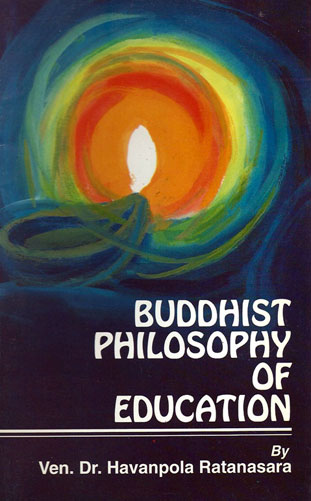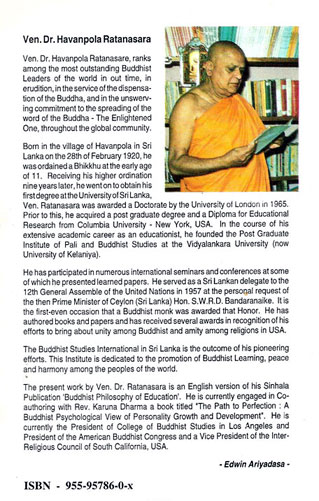Ven. Dr. Havanpola Ratanasara was born in the Sri Lanken Village of Havanpola Feb. 28, 1920. With his parent's permission, he became a novice monk at the age of 11, taking full ordination 9 years later at the age of 20. He went on to obtain his first university degree from the University of Sri Lanka, then a post graduate degree and diploma for Educational Research from Columbia University in New York and finally a PhD in education from the University of London in 1965. In the course of his academic career as an educator, he founded the Post Graduate Institute of Pali and Buddhist Studies at the University of Kelaniya in Sri Lanka.
In the early years, he participated in numerous international seminars and conferences presenting papers on various topics. One of his many books titled, “Buddhist Philosophy of Education” was written to emphasize the feasibility of formulating a general system of education built on a foundation of Buddhist philosophy. First published in 1969 it was reprinted in 1995 to celebrate the opening of his ‘Buddhist Studies International’ in Sri Lanka, an institute dedicated to the promotion of Buddhist learning, peace and harmony among the peoples of the world.
In 1957 at the personal request of the Prime Minister of Sri Lanka, Ven. Ratanasara was asked to represent Sri Lanka as a delegate to the United Nations, the first Buddhist monk awarded this honor. He is reported to have said during an interview in 1958 on being a United Nations delegate, “You Americans believe in atomic bombs, hydrogen bombs and all those things,” he said the other day. “Well, we don’t. We are a peace-loving people and want no association with any power bloc.”
In 1980 Dr. Ratanasara emigrated to the United States, settled in Los Angeles and devoted himself to the promulgation of inter-Buddhist, inter-religious understanding and education. He initiated the establishment of the Buddhist Sangha Council of Southern California, an organization of Buddhist clergy of all traditions, serving as its president. He also served as Executive President emeritus of the American Buddhist Congress, a national organization of Buddhist temples and organizations, of which he is a founding member. In 1983 he founded the College of Buddhist Studies, Los Angeles and was the president and a member of the academic staff.
Dr. Ratanasara played an active role in inter-religious understanding for twenty years. He served as a Board Director for numerous international conferences on religion and peace. He was a member of the executive Council of the Interreligious Council of So. California and served as a Vice President. He served as Co-Chair for the on going Buddhist- Roman Catholic dialogue in Los Angeles. In 1992 Ven. Ratanasara was named the Chief Sangha Nayake (Judicial Patriarch) for the Western Hemisphere for his lineage, formalizing his role as chief advisor of his tradition. In 1995 he founded the Buddhist Studies International Center in Iriyaweteya, Sri Lanka, which has become a center for those who want to study Buddhism and meditate in a true Buddhist cultural setting. Buddhist Studies International is a center of training for American, Latin American, Korean, Indian, and Bangladesh students wanting to become teachers of Buddhism in their native homelands.
From his paper, "The Importance of Interfaith Dialogue" presented at the Intermonastic Dialogue Gethsemani Monastery, Louisville, Kentucky July, 1996.
"Now, it seems to me that since we are so ready to I embrace each other, and claim that we are already honorary members of each other's religion, there is really no reason why we cannot continue talking. We are alike in that we all suffer, and our primary concern is the end of suffering; this is what we call liberation. As His Holiness the Dalai Lama has put it: "I am interested not in converting other people to Buddhism but in how we Buddhists can contribute to human society, according to our own ideas." And I have always maintained, and maintain today, that if we had enough in common thirty years ago to begin talking to each other, then we have enough in common to continue."
At the time of his death May 26, 2000, he was working on: "The Path to Perfection: A Buddhist Psychological View of Personality, growth and Development." |



